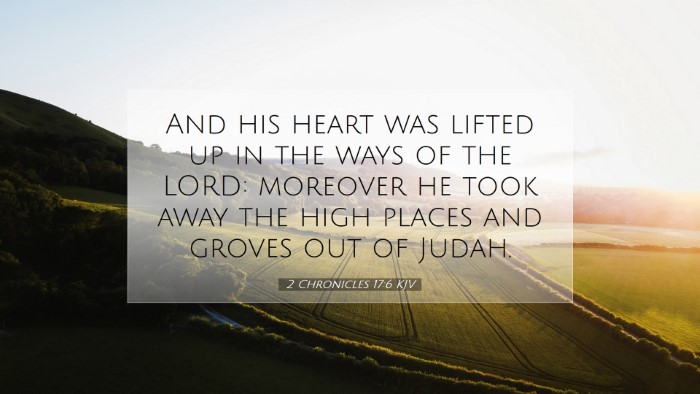Commentary on 2 Chronicles 17:6
Verse: "And his heart was lifted up in the ways of the Lord: moreover he took away the high places and groves out of Judah."
Introduction
This passage provides insight into the reign of King Jehoshaphat of Judah. His commitment to following the ways of the Lord and his actions against idolatry provide significant lessons for spiritual leadership and reform.
Analysis of the Text
Heart Lifted Up
Matthew Henry comments on the phrase "his heart was lifted up" noting that Jehoshaphat’s inner disposition was one of genuine piety. It reflects an elevation of spirit and purpose directed toward God's ways. This suggests that a leader's heart must be aligned with God's will for effective governance.
Likewise, Albert Barnes underscores the importance of a heart devoted to the Lord. He posits that this inner transformation precedes external action; thus, Jehoshaphat’s piety was not merely ceremonial but rooted in a sincere spiritual awakening.
In the Ways of the Lord
The phrase "in the ways of the Lord" indicates Jehoshaphat's pursuit of righteousness and adherence to divine principles. Adam Clarke elaborates that the 'ways' here refers not only to the statutes and ordinances but also to a lifestyle that reflects godly wisdom. Jehoshaphat, by walking in God’s ways, offered a model for both individual believers and the nation as a whole.
Actions Against Idolatry
Taking Away High Places
Matthew Henry also observes Jehoshaphat's courage in taking away the high places and groves, which were places of idol worship. This act of reform signifies the king’s zeal for purifying worship in Judah and signifies a decisive break from the syncretism that had tainted the nation's religious life. The high places often represented the persistence of pagan rituals even among God's people.
Albert Barnes adds that Jehoshaphat’s removal of these high places was a crucial step toward restoring true worship. His actions speak to the necessity of addressing and eliminating any forms of false worship or distractions that might lead the people away from God. The king’s leadership was key to this spiritual reformation.
The Groves and Their Significance
The mention of "groves" is significant as they were often associated with the worship of Asherah or other Canaanite deities. Clarke notes that these groves represented not just places of worship but cultural and societal challenges to the faith of Israel. By removing them, Jehoshaphat was not merely exerting political power but was making a theological statement about the purity of worship expected in Judah.
Lessons for Contemporary Believers
The Importance of Spiritual Leadership
This verse teaches that spiritual leaders must have their hearts set on God, as the effectiveness of their leadership is directly tied to their personal relationship with the Lord. Both Henry and Barnes encourage pastors and leaders today to cultivate an authentic faith that prioritizes God's directives over personal ambition or societal pressures.
Call for Reform and Purity
The actions of Jehoshaphat serve as a timeless reminder for all believers to examine their lives and churches for any remnants of idolatry, whether they be physical artifacts or modern distractions. The focus must remain on pure worship, without compromise, which was central to Jehoshaphat's reforms.
Conclusion
2 Chronicles 17:6 not only highlights a moment in Judah’s history but also serves as an enduring call to align our hearts with God. Through the examples laid forth by Jehoshaphat and enriched by the insights of prominent biblical commentators, pastors, students, and theologians are urged to lead with integrity, enact necessary reforms, and firmly plant their hearts in the ways of the Lord.


